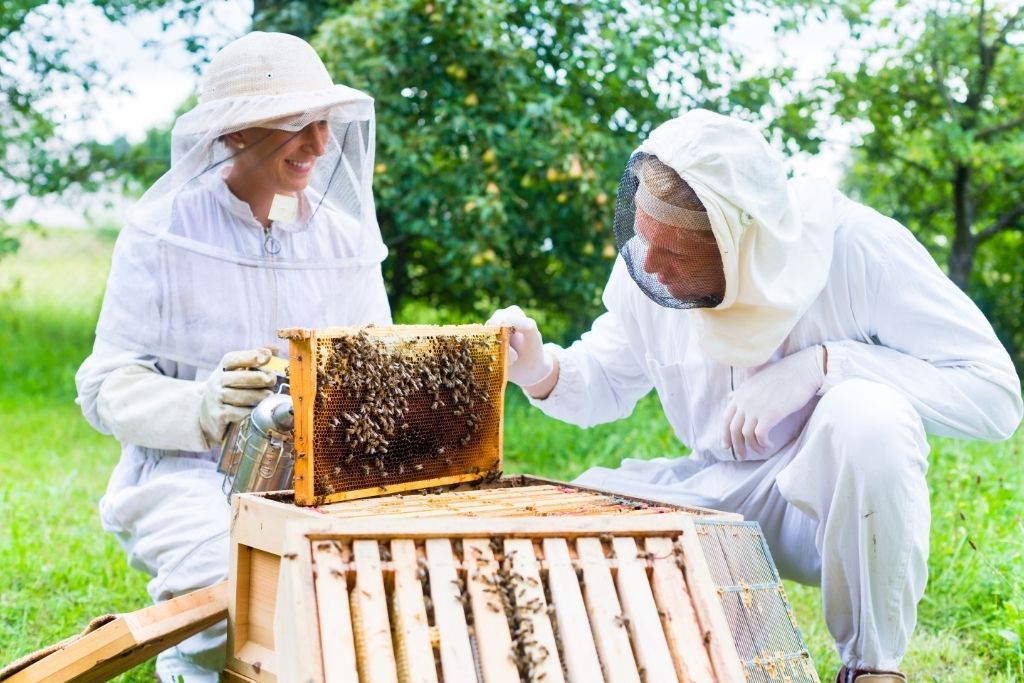Have you been contemplating getting involved with beekeeping, whether for profit or as a hobby? If so, one of the best ways to get started is by contacting your state’s beekeeping association, which can put you in contact with locals in your area to help you.
If you actually take the time to communicate with beekeepers, you’ll find them to be very helpful and would most likely support your efforts if you’re seriously interested and passionate.
Today, I’m going to provide you with 9 Tips For Getting Started With Beekeeping.
Let’s cover them now…
1)) Join Local Beekeeping Associations
Before you buy any equipment or buy a hive, get involved in your local associations and groups so that you can learn everything that you need to know. There’s no reason to reinvent the wheel or make the process harder than it has to be, which will only make you quit before you even begin the process.
2)) Learn Everything You Can
It goes without saying that the more you learn about beekeeping, the better you’ll become.
Learned knowledge combined with activity knowledge can equal mastery if you remain consistent over a long enough period of time.
Get your knowledge from a combination of sources such as physical books, e-books, manuals, audio, and especially video instruction.
Although, video instruction is the most powerful way to learn the step-by-step how-to processes, combining them all will allow you to master beekeeping a lot faster.
Remember what I said about not reinventing the wheel?
Modeling successful beekeepers is the smartest route you can take to reduce mistakes and reach that mastery level.
3)) Check Your State and Local Laws
There are different laws and ordinances for different areas of the country you live in.
Therefore, before you get started, you must find out if it’s even possible for you to own a hive in your location.
If you live in a small neighborhood, it might not be possible to do it on your own land.
But, if you are willing to share the harvest, people with a lot of land might let you set them up for free on their property.
4)) Get Ready for Starting in the Spring
The best time to start a new hive is in the spring. So as you’re learning and planning, check your calendar.
Also, talk to local beekeepers who understand more about the procedures than you, because when you start will be very location-centric.
5)) Invest Your Beekeeping Equipment
Based on when you plan to start, begin to order all the gear and equipment you’ll need.
Sometimes you can find used equipment, but you can also buy most of everything you need right from Amazon.
Believe it or not, beekeeping equipment isn’t expensive, especially if you’re starting off small.
6)) Buy Your Bees
When you’re finally ready and have learned all you can from books and others, you’re ready to order your bees and get started.
That’s right; it’s time to take that leap of faith!
Don’t be worried about failing. Take what you learned and put it into practice and you will eventually be successful.
We all know that the only way to become proficient is by doing because there’s no replacement for putting in the work unless you hire someone, but that would take away all the fun and enjoyment.
>> See a great selection of Beekeeping Supplies on Amazon
7)) Start with Two Colonies
Don’t start with just one colony. The reason is that if something goes wrong and one hive is weak, having two colonies gives you a higher chance of success.
You can manage your hives better and even fix a problem when a queen dies or one hive is weak.
You know how the old saying goes, “Never Put All Of Your Eggs Into One Basket!”
8)) Check on Your Hives Periodically
Once you have your hives up and running, you should check on them occasionally.
You don’t need to do so too often in terms of touching them, but there are people who steal hives, so you need to establish a regular presence, which will hopefully serve as a deterrent.
You should also do health checks on your hives multiple times per year because there are other threats such as other bee colonies, rodents, ants, tracheal mites, wax moths, and so on that could raid them.
9)) Harvest Your Honey
Each hive can produce about 60 pounds of honey, so how much you earn will be dependent on how much honey your hives produce, how many hives you can handle, the weather, and a lot of other factors, just like most types of farming.
>> See a great selection of Beekeeping Supplies on Amazon
Conclusion
Did you know that outside of collecting and selling honey, you can also raise hives to rent out for pollination?
When you think outside of the box a little, you could come up with all types of uses for raising bees, as long as they are ethical and don’t hurt them.
After you’ve mastered the art of beekeeping, you may want to consider becoming a consultant and help others learn the process.
There are also people who find unwanted hives on their property that they’ll give you if you get rid of them.
There is so much you can do as a beekeeper, especially as an expert.
The biggest benefit of raising bees is the important role they play in our ecosystem, in terms of the world’s plant-based food supply.
Bees cross-pollinate our crops so that we can enjoy fruits and veggies.
Not to mention, their honey, which is rich in antioxidants.
If you’ve been on the fence about whether or not you’d like to move forward with beekeeping, I recommend that you do a lot of research before jumping in head first.
Life is short, and if there’s something you want to do such as beekeeping, and feel passionate about it, have the means, and is able to.
Why not go for it?
Download Our Free E-book!







